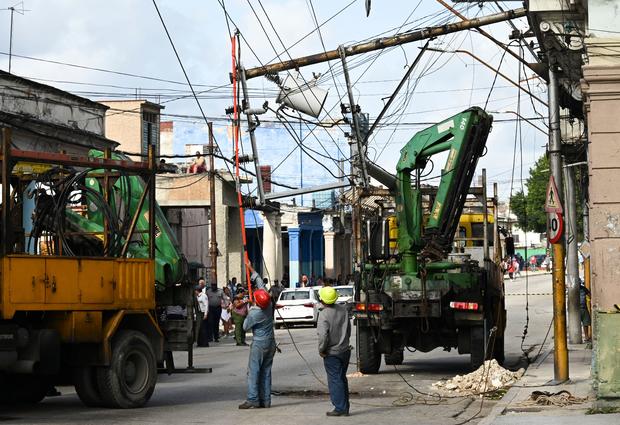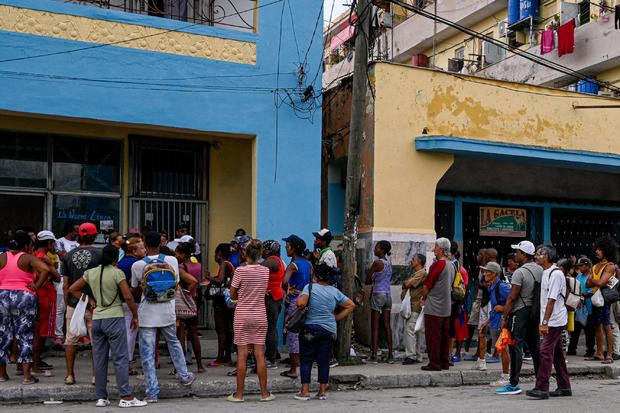Cubans suffer as power outage caused by Hurricane Ian drags on
Ivette Garrido hurried last week to get the 13 pounds of subsidized chicken allotted to her family by Cuba’s government and put it in the freezer, happy to have meat to get through Hurricane Ian.
Now she is considering giving the chicken to her three dogs before it goes bad as a huge power blackout caused by the storm extends beyond two days and everything in her freezer thaws amid scorching temperatures.
The government has not said what percentage of the population remains without electricity, but electrical authorities said only 10% of Havana’s 2 million people had power Thursday.
“We are not having a very good time, trying to survive, to keep things from thawing,” said Garrido, who lives with her mother and a 19-year-old daughter in the town of Cojimar on the outskirts of Havana.
Hundreds of thousands of Cubans are facing similar situations.
Small protests popped up in Havana Thursday night with people demanding the restoration of electricity.
An Associated Press journalist saw a total of about 400 people gathered in at least two spots in the Cerro neighborhood shouting, “We want light, we want light,” and banging pots and pans.
Ian crossed western Cuba on Tuesday before heading north to Florida. It initially knocked out power to a few provinces, but problems compounded and soon the power grid collapsed nationwide, affecting 11 million people, the first time a total blackout has happened in living memory.
YAMIL LAGE/AFP via Getty Images
The storm also left three people dead and caused still-unquantified damage.
Electricity returned in some parts of Cuba on Wednesday, while it came on then shut off again in other parts. Experts said the total blackout showed the vulnerability of Cuba’s power grid.
Authorities have promised to work without rest to address the issue.
A half-dozen Havana residents interviewed by The Associated Press on Thursday were tense because of the lack of electricity, which has also left them without water since electric motors power the pumps that bring water to their taps. Many homes can’t cook because they use electric stoves following a campaign by authorities to eliminate artisanal stoves.
“We have never been so long without electricity,” Garrido said. “They put it at 24 hours, at 36, but it’s already been more than 48. It’s criminal. Who is responsible for this?”
She has placed bottles of frozen water that had been in the freezer next to the chicken, along with some pork and sausages, to try to preserve the meat longer. A fan and television also await the return of electricity.
Calls by AP to a dozen people in Cuba’s main cities — Holguín, Guantánamo, Matanzas, Ciego de Ávila, Camagüey and Santiago — found similar problems to Havana, with most reporting their neighborhoods were still without electricity.
ADALBERTO ROQUE/AFP via Getty Images
Authorities say the total blackout happened because of a failure in the connections between Cuba’s three regions — west, center and east — caused by Ian’s winds.
Cuba’s power grid “was already in a critical and immuno-compromised state as a result of the deterioration of the thermoelectric plants. The patient is now on life support,” said Jorge Piñon, director of the Center for International Energy and Environmental Policy’s Latin America and Caribbean Latin America and Caribbean program at the University of Texas.
Being interconnected “is the perfect analogy for the domino effect in which you knock down a domino and hit all the others in a chain reaction,” he said.
Cuba is suffering an economic crisis, produced by a combination of U.S. sanctions, the effects of the COVID-19 pandemic and inefficiencies. The island’s GDP plummeted 11% in 2020 and grew 1.3% in 2021. Cubans were already living with scheduled power blackouts.
Cuba has 13 power generation plants, eight of which are traditional thermoelectric plants, and five floating power plants rented from Turkey since 2019. There is also a group of small plants distributed throughout the country since an energy reform in 2006.
But the plants are poorly maintained, a phenomenon the government attributed to the lack of funds and U.S. sanctions. Complications in obtaining fuel is also a problem.
“Unfortunately, it will be a long recovery process that will also have to cover the generation deficit that already existed before the hurricane, all this at a high economic cost that the country cannot afford,” Piñon said.
For all the latest World News Click Here
For the latest news and updates, follow us on Google News.



